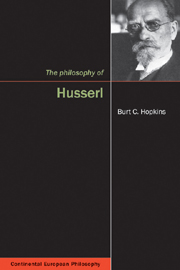Book contents
- Frontmatter
- Contents
- Acknowledgements
- Abbreviations
- Prolegomenon: Husserl's turn to history and pure phenomenology
- I Plato's and Aristotle's theory of eidē
- II From descriptive psychology to transcendentally pure phenomenology
- III From the phenomenology of transcendental consciousness to that of monadological intersubjectivity
- IV From monadological intersubjectivity to the historical a priori constitutive of all meaning
- V The unwarranted historical presuppositions guiding the fundamental ontological and deconstructive criticisms of transcendental philosophy
- Epilogue: Transcendental-phenomenological criticism of the criticism of phenomenological cognition
- Coda: Phenomenological self-responsibility and the singularity of transcendental philosophy
- Notes
- Bibliography
- Index
Epilogue: Transcendental-phenomenological criticism of the criticism of phenomenological cognition
- Frontmatter
- Contents
- Acknowledgements
- Abbreviations
- Prolegomenon: Husserl's turn to history and pure phenomenology
- I Plato's and Aristotle's theory of eidē
- II From descriptive psychology to transcendentally pure phenomenology
- III From the phenomenology of transcendental consciousness to that of monadological intersubjectivity
- IV From monadological intersubjectivity to the historical a priori constitutive of all meaning
- V The unwarranted historical presuppositions guiding the fundamental ontological and deconstructive criticisms of transcendental philosophy
- Epilogue: Transcendental-phenomenological criticism of the criticism of phenomenological cognition
- Coda: Phenomenological self-responsibility and the singularity of transcendental philosophy
- Notes
- Bibliography
- Index
Summary
As we have seen, Husserl's call for a phenomenological criticism of the criticism of phenomenological cognition occurs within the context of the third stage of the development of his phenomenology, and it refers to the critical reflection on the presuppositions that inform the “naïveté of apodicticity” belonging to the “Cartesian” character of this stage of his phenomenology. This naivety, characterized by Husserl as the methodically necessary limit of the “first” phase of phenomenological cognition to determine the scope and limits of phenomenological evidence at the expense of attending to its mode of givenness, is, as we have also seen, addressed by the fragmentary investigation of the historicity of the givenness of phenomenological cognition that composes the last stage of Husserl's thought.
As the interrelated moments of primal accomplishment and eventual sedimentation of the meaning that makes possible the handing down, over generations, of a science such as geometry, Husserl's adumbration of historicity reveals its essential structure to consist in precisely the intentionality that connects these two moments. These moments, in turn, are accessible to phenomenological cognition only in a historically motivated phenomenological reflection whose intentionality enquires backwards from its reflected object to the original acts of transcendental subjectivity responsible for its constitution. The movement of the intentionality belonging to this “backwards reflection” thus charts a course from its reflected object's irreal meaning, which is given in the living present of the experience belonging to the transcendental Ego as a “numerically identical” unit of meaning across the multiplicity of its temporally individuated lived-experiences, to the “reactivation” of the evidence-giving acts belonging to the experience of a possible transcendental Ego that are presupposed by this meaning.
- Type
- Chapter
- Information
- The Philosophy of Husserl , pp. 264 - 272Publisher: Acumen PublishingPrint publication year: 2010

